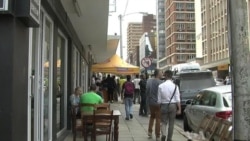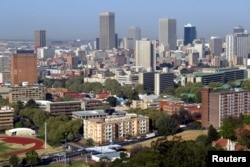JOHANNESBURG, SOUTH AFRICA —
London. Paris. Lagos. The list of international megacities is growing, with more and more African entries on the list. Mayors from the world’s megacities met this week in Johannesburg to discuss the challenges their cities face.
Like many Johannesburg residents, Simphiwe Kahla came from somewhere else. The 24-year-old student hails from a town in the rural Eastern Cape province, but said Africa’s economic hub was now his home.
“ Here, you actually stay on your toes. It keeps you on your toes, it’s all about hustling, it’s all about business. I think I would really get bored if I would have to return to the Eastern Cape,” said Kahla.
Simphiwe Kahla is one of millions of people who have in recent years swarmed to Africa’s megacities: Addis Ababa, Ethiopia; Cairo, Egypt; Lagos, Nigeria and Johannesburg, South Africa. Together these very different cities contain a staggering 20 million people.
Mayors from more than 40 megacities met in Johannesburg to discuss the many challenges faced by megacities.
Former New York City Mayor Michael Bloomberg lauded the urbanization of Africa.
“In 2011, there were 52 African cities with a population higher than one million people. By 2016, in only two years, there will be around 65. And that’s a good thing," he said.
Africa megacities faced extra challenges, said Johannesburg’s executive mayor, Mpho Parks Tau.
“The difference of course is that megacities in the developing world have to deal with informalization of settlements because as people come into the city there isn’t always adequate accommodation to have those people coming to the cities. A lot of them find themselves in inadequate accommodation in slum environments,” said Tau.
Hannah Edinger, a director with the research group Frontier Advisory, said one of the things that makes African megacities unique was that there just weren’t enough of them.
“What is interesting about African cities, unlike European cities for example, is there is only a few cities, and these cities are expanding quite rapidly," said Edinger.
Many new Johannesburg residents, like Songezo Mcapukisi, said they ccme here - not for the culture, the diversity or the restaurants - but for the money.
“We’re faced with the reality that our skills, they are only needed in the megacities, in the metropolitan cities. You know, I studied accounting, and there are no jobs for accountants back home,” Mcapukisi.
Lawyer Chris Baird is one of the large number of young professionals who have flocked to Johannesburg.
“All of my friends are here. It’s a great place in terms of being a young professional. It’s where the great work is. It’s the economic hub of the country … I’ll give you, it’s not nearly as pretty as Cape Town, but it’s where you need to be if you want to climb up the ranks,” he said.
It may be a concrete jungle, but for more and more Africans, it’s home.
Like many Johannesburg residents, Simphiwe Kahla came from somewhere else. The 24-year-old student hails from a town in the rural Eastern Cape province, but said Africa’s economic hub was now his home.
“ Here, you actually stay on your toes. It keeps you on your toes, it’s all about hustling, it’s all about business. I think I would really get bored if I would have to return to the Eastern Cape,” said Kahla.
Simphiwe Kahla is one of millions of people who have in recent years swarmed to Africa’s megacities: Addis Ababa, Ethiopia; Cairo, Egypt; Lagos, Nigeria and Johannesburg, South Africa. Together these very different cities contain a staggering 20 million people.
Mayors from more than 40 megacities met in Johannesburg to discuss the many challenges faced by megacities.
Former New York City Mayor Michael Bloomberg lauded the urbanization of Africa.
“In 2011, there were 52 African cities with a population higher than one million people. By 2016, in only two years, there will be around 65. And that’s a good thing," he said.
Africa megacities faced extra challenges, said Johannesburg’s executive mayor, Mpho Parks Tau.
“The difference of course is that megacities in the developing world have to deal with informalization of settlements because as people come into the city there isn’t always adequate accommodation to have those people coming to the cities. A lot of them find themselves in inadequate accommodation in slum environments,” said Tau.
Hannah Edinger, a director with the research group Frontier Advisory, said one of the things that makes African megacities unique was that there just weren’t enough of them.
“What is interesting about African cities, unlike European cities for example, is there is only a few cities, and these cities are expanding quite rapidly," said Edinger.
Many new Johannesburg residents, like Songezo Mcapukisi, said they ccme here - not for the culture, the diversity or the restaurants - but for the money.
“We’re faced with the reality that our skills, they are only needed in the megacities, in the metropolitan cities. You know, I studied accounting, and there are no jobs for accountants back home,” Mcapukisi.
Lawyer Chris Baird is one of the large number of young professionals who have flocked to Johannesburg.
“All of my friends are here. It’s a great place in terms of being a young professional. It’s where the great work is. It’s the economic hub of the country … I’ll give you, it’s not nearly as pretty as Cape Town, but it’s where you need to be if you want to climb up the ranks,” he said.
It may be a concrete jungle, but for more and more Africans, it’s home.






